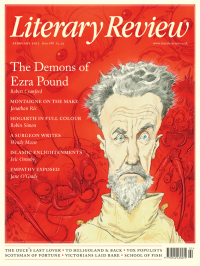John Self
Doubled Vision
The Blot
By Jonathan Lethem
Jonathan Cape 289pp £16.99
In a book full of curiosities, the first is the title: Jonathan Lethem’s new novel, published in the UK as The Blot, was named A Gambler’s Anatomy on US publication last year. This is unusual, as the title of a novel is central to its purpose and integrity: ‘it lives and breathes, or it tries, on every page,’ wrote Martin Amis. The US title is formal and mock-archaic, while The Blot is a starker, more striking choice – which may be reason enough for the change. The switch seems apt, too, for a novel that flits hyperactively between ideas and themes.
This is a story of backgammon, telepathy, gambling, facial surgery, international travel, political resistance and miniature burgers. Our hero is Alexander Bruno, a backgammon expert who travels the world making a living by ‘relieving wealthy men of the delusion that they’re any good at backgammon’. Lethem’s choice of backgammon is interesting: it is a game little enough played to make it a blank canvas and by the same token a choice so idiosyncratic that it reinforces the idea of Lethem – creator of characters with names like Perkus Tooth, Chase Insteadman and Garris Plybon – as an author in thrall to quirkiness.
As the story begins, Bruno is suffering from – or rather experiencing, since he doesn’t panic about it for reasons that become clear – a blot on his vision, which initially he dismisses as ‘a retinal floater gone mad or the looming ghost of his inattention’, until it brings along persistent headaches and sudden collapses in the street after a game in Berlin. He’s diagnosed with an atypical meningioma – a tumour growing gruesomely behind his face, in ‘the Bermuda Triangle of Self’ – and travels home to California to have it removed by the uniquely gifted surgeon Noah Behringer (‘a medical Santa Claus’ who listens to Jimi Hendrix and shares sex anecdotes with the theatre staff while operating).
This is the first of a series of satisfying refusals to give the reader what they expect. The blot is not destined to remain undiagnosed and handily symbolic; it has a cause and can be removed. The next subverted expectation is when a long immersive scene describing the surgery (reminiscent of Ian McEwan’s Saturday) turns out to be not a switch in narrative viewpoint, but a smart foreshadowing of a plot line about telepathy. Bruno, we learn, somehow became able to read other people’s thoughts during a previous hospital stay when being treated for burns at the age of eleven, but this ability faded away. The third about-turn is when, following the surgery, Bruno discovers that it was the tumour that was blocking his telepathy; now his gift has come roaring back and the world is once again ‘both riotous and raw’. This leads him to make of Behringer a request unique among cancer patients: ‘I need it back. I need back what you took from me.’
All of this could make a pleasing setup for what is to come, but we haven’t got to the politics yet, or the burgers, or Bruno’s upbringing in a guru’s cult, or the former childhood friend of his who becomes a shadowy threat – or the ‘prostitute’ Madchen Abplanalp (another quirky name). Lethem writes so mouthwateringly well about the grilling of miniature burgers that it’s frustrating not to see him write in greater depth on the more intriguing subjects thrown up by the novel. Yet even at the current length it can seem chaotic and crammed. Too much confectionery, too rich! It has recurring references to The Big Lebowski, and like the Coen brothers’ film, The Blot is charming but loose, its charm partly arising from its looseness.
In a sense, The Blot has everything you could want – jazzy dialogue, big characters, strong set pieces, interesting themes (rationalism, delusion) and certainly no longueurs – but it can also seem shapeless. This is despite the care Lethem has taken over the outer structure, in which chapters are numbered like the sides of a backgammon doubling cube; the game’s terminology and thinking run through the story. A blot, for example, is also the term in backgammon for a single unprotected playing piece, and by extension a reminder of isolation: the loneliness of greatness, the curse of talent. It’s a reminder, too, that prodigious talent like Lethem’s must be disciplined in order to truly take flight.

Sign Up to our newsletter
Receive free articles, highlights from the archive, news, details of prizes, and much more.@Lit_Review
Follow Literary Review on Twitter
Twitter Feed
The era of dollar dominance might be coming to an end. But if not the dollar, which currency will be the backbone of the global economic system?
@HowardJDavies weighs up the alternatives.
Howard Davies - Greenbacks Down, First Editions Up
Howard Davies: Greenbacks Down, First Editions Up - Our Dollar, Your Problem: An Insider’s View of Seven Turbulent...
literaryreview.co.uk
Johannes Gutenberg cut corners at every turn when putting together his bible. How, then, did his creation achieve such renown?
@JosephHone_ investigates.
Joseph Hone - Start the Presses!
Joseph Hone: Start the Presses! - Johannes Gutenberg: A Biography in Books by Eric Marshall White
literaryreview.co.uk
Convinced of her own brilliance, Gertrude Stein wished to be ‘as popular as Gilbert and Sullivan’ and laboured tirelessly to ensure that her celebrity would outlive her.
@sophieolive examines the real Stein.
Sophie Oliver - The Once & Future Genius
Sophie Oliver: The Once & Future Genius - Gertrude Stein: An Afterlife by Francesca Wade
literaryreview.co.uk